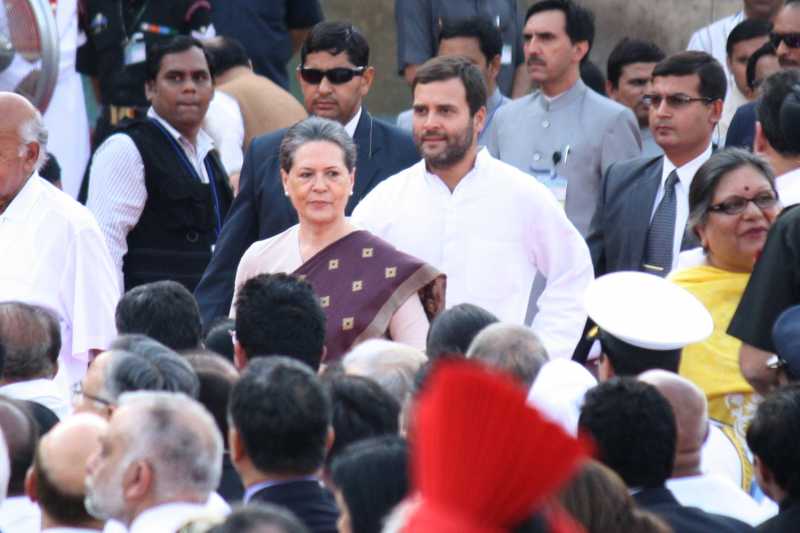BJP-Congress tension will hurt reforms…writes Amulya Ganguli
 It has long been said that the economic reforms are irreversible. Moreover, the Left claims that both the Bharatiya Janata Party (BJP) and the Congress are on the same page on this subject since they both pursue what the Communists call “neo-liberal” policies.
It has long been said that the economic reforms are irreversible. Moreover, the Left claims that both the Bharatiya Janata Party (BJP) and the Congress are on the same page on this subject since they both pursue what the Communists call “neo-liberal” policies.
Yet, there are complications. As was evident from the stalling of reforms in the twilight years of the Manmohan Singh government, presumably because of the reservations of Sonia Gandhi and her Left-of-centre National Advisory Council, the market-oriented initiatives do have powerful critics.
Where the BJP is concerned, the very fact that the supposedly pro-business Narendra Modi is going slow in the matter of introducing big-ticket reforms shows how hard it is for even supporters of reforms to push ahead.
Now, another bump has appeared on the road. It is the increasing bitterness between the two “national” parties – the BJP and the Congress. The acrimony between them was palpable not only from the Congress’ belligerence on the day when the BJP government in Maharashtra won a controversial trust vote, but also from the Congress’ decision, bordering on crudity, not to invite the prime minister to the functions which it has organized on the occasion of Jawaharlal Nehru’s 125th birth anniversary.
It is another matter that Modi will not be in India when these are held. But the Congress’s gratuitous discourtesy towards him does not show the party in a favourable light, especially when it is celebrating the birthday of one of the most cultured personalities in Indian public life – past and present.
Both these displays of aggression have been interpreted as evidence of a demoralized outfit trying to boost its flagging spirits with a show of street-level machismo. But what is more important than the Congress’ in-your-face rudeness towards the BJP is the distinct possibility that the two parties will be on the lookout for each and every opportunity to trip one another up.
Whatever impact such offensive conduct has in the political field, what is worrisome for the country is the resultant roadblocks which the reforms may face in the coming days. It goes without saying that notwithstanding the BJP’s majority in the Lok Sabha, it still needs the Congress’ support in the two houses of parliament to implement measures like amending the land acquisition law, introducing labour reforms, passing the Goods and Services Tax (GST) and take other steps such as disinvestment.
However, the Congress is unlikely to cooperate in its present combative mood. Even in normal times, Indian politicians tend to oppose when sitting in the opposition benches what they supported when in power. It was in keeping with this cussed attitude that the Congress forced the BJP to send to the select committee the proposal to raise the foreign investment cap in the insurance sector to 49 percent, which used to be the Congress’ own proposition.
Now, it is likely to be even more obstructionist. What is more, its wilful tendency to thwart any pro-reforms move will be aggravated by its belief that the party needs to turn Left.
Rahul Gandhi has said that the Congress follows the path of “love” while others prefer to be “angry”. But currently, there is no love lost between the saffron outfit and the (no longer) Grand Old Party.
As for the BJP, its disadvantage is that it is virtually bereft of friends at present. Where the reforms are concerned, it is alone for all practical purposes.
Except for the Biju Janata Dal, it cannot expect support from any other party, for the other splinter Janata groups – Laloo Yadav’s Rashtriya Janata /Dal (RJD) and Nitish Kumar’s Janata Dal-United – are Lohiates in their belief with an emphasis on caste and socialism.
It is the same with Mulayam Singh Yadav’s Samajwadi Party, H.D. Deve Gowda’s Janata Dal-Secular and Mamata Banerjee’s Trinamool Congress.
In a line-up in parliament, therefore, a large number of parties will be against the BJP. The latter has also made its case worse by alienating some of its allies like the Shiv Sena. Furthermore, there are reports that the BJP is not too keen on maintaining its present ties with the Akali Dal.
What this seeming vulnerability of the BJP means is that it will not be too confident in rebuffing the Congress even as the latter ups the ante.
The BJP’s nervousness is evident from the fact that despite its success in emerging as the first party in Maharashtra, the party botched its case by the dubious manner in which it won the trust vote.
However, nearly all the parties appear to have had their own varying reasons for avoiding a clear count of votes. For instance, the Nationalist Congress Party (NCP) would not have relished being seen openly lending support to the BJP while the latter was chary of being in the company of what Modi called the “naturally corrupt party”.
Similarly, the Congress could not afford to oppose Devendra Fadnavis’ government along with the “communal” Shiv Sena, and the Sena itself could not take the risk of some of its members voting for the “wrong” side.
Since the Maharashtra government has started its journey on a faltering note, the BJP has realized that it is not all ‘achhe din’. The Congress cannot but take advantage of its difficulties.